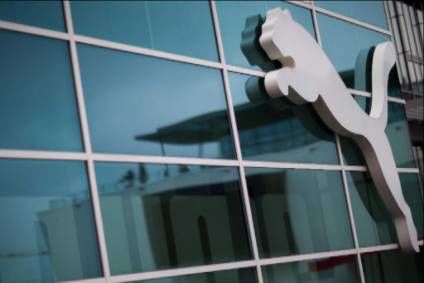
Puma has published its fourth-quarter and full-year results:
- Q4 sales increased by 14% currency-adjusted to EUR1.77bn (US$2.01bn) from $1.52bn a year earlier.
- Operating result (EBIT) improved to EUR65m from EUR63m last year.
- Q4 net earnings fell to EUR8m from EUR25m a year prior.
- FY sales were up 32% currency-adjusted to EU6.81bn from EUR5.23bn a year prior.
- EBIT amounted to EUR557m, compared to EUR209m in 2020.
- FY net earnings improved to EUR310m from EUR79m.
“2021 was a very successful year for us. Despite all the issues and obstacles related to Covid-19 and political tensions around the world, we had the best year in Puma’s history. The sales growth of 32% to EUR6.81bn and an EBIT growth of 166% to EUR557m are results that we are proud of,” said CEO Bjørn Gulden. “Compared to the pre-pandemic level in 2019, our sales even increased by 30%. Our continued brand momentum combined with high operational flexibility are the main reasons for these achievements. Our strategy of working closely together with our suppliers and retail partners to manoeuvre through all the short-term issues and obstacles without hindering our mid-term momentum paid off.”
Commenting on the numbers, Louise Deglise-Favre, associate apparel analyst at Global Data, says Puma recorded annual sales growth of 30% in FY2021, beating its estimates of 25% growth in October 2021.
“On a two-year comparison, Puma’s full year sales grew 23.7% due to the sustained demand for sportswear due to the continuation of hybrid working and the resilience of its supply chain amidst global disruption. It recorded an exceptional performance in the Americas, with sales up 35.6% on FY2019, due to its strong brand image boosted by collaborations with American athletes such as NBA player LaMelo Ball, and EMEA performed strongly too, up 26.5% on FY2019. “In APAC, a lacklustre performance in Greater China held back growth, though it still rose 5.1% on a two-year comparison, driven by India, Japan and Oceania.
“Puma has continued collaborating with top athletes and celebrities, fuelling its relevance in its core markets of Europe and the Americas. The brand has established itself as a key partner in sports where competitors Nike and Adidas have a smaller presence, such as motorsports.
“As well as building its sports reputation, Puma has not forgotten the importance of athleisure, using celebrity collaborations with the likes of Dua Lipa and high-end designer brand Pronounce to promote this. These marketing strategies will allow the brand to stay relevant in a post-pandemic world, where performance sportswear has regained importance as team sports and major events such as the Beijing Winter Olympics have resumed, but athleisure will remain crucial due to long-term casualisation trends.”

US Tariffs are shifting - will you react or anticipate?
Don’t let policy changes catch you off guard. Stay proactive with real-time data and expert analysis.
By GlobalDataDeglise-Favre adds Puma has dealt with supply-chain issues “remarkably well”, especially with its South East Asia suppliers, where its close relationships allowed it to successfully navigate sporadic lockdowns and manufacturing delays in the first half of the year.
“Its agility and resilience place the brand in a favourable position in FY2022, as supply chain issues are due to continue during the first half of the year and possibly beyond.”



